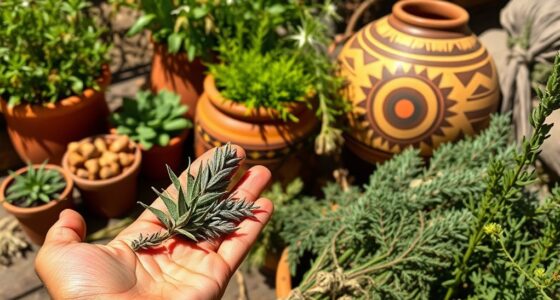As we pursue a degree in herbology, we need to explore various study options, from short courses to extensive degree programs. A strong foundation in principles of herbal medicine, botany, and holistic health practices is essential, and understanding anatomy and physiology is vital. We must navigate different herbalism styles, develop business acumen, and stay ethical and informed about legal regulations. By doing so, we'll gain a well-rounded education and set ourselves up for a successful career in herbology. As we continue on this path, we'll discover more about how to create a thriving herbal practice that prioritizes client well-being.
Key Takeaways
• Explore various herbology study options, including short courses, degree programs, and online courses, to find the best fit for your goals.
• Build a strong foundation in herbal medicine by studying botany, anatomy, physiology, and holistic health practices.
• Consider different herbalism styles, such as energetic or taste profile-focused approaches, to gain a well-rounded education.
• Develop business acumen by learning budgeting, marketing, and customer relations to ensure a thriving herbal career.
• Stay informed about legal regulations and maintain ethical boundaries, avoiding diagnosis and prescription, to prioritize client well-being.
Exploring Herbology Study Options
We've a variety of herbology study options to choose from, ranging from short courses to extensive degree programs at universities and specialized institutions.
Whether we're looking to become a certified herbalist or simply want to deepen our understanding of plant medicine, there's a program out there for us.
Some universities offer undergraduate and graduate degrees in herbology, providing in-depth education on plant identification, herbal medicine, and cultivation. Online herbology courses are also available, covering topics like herbal remedies, botany, and herbal traditions.
For those who prefer hands-on learning, specialized herbology schools offer training in growing, harvesting, and preparing herbs for medicinal use. We can choose to focus on specific aspects of herbology, such as herbal medicine, botanical pharmacology, or holistic herbalism, based on our career goals.
Herbalist training programs can provide us with the skills and knowledge needed to succeed in this field. By exploring these options, we can find the program that best fits our needs and interests, setting us up for success in our herbology journey.
Building a Strong Foundation

As we commit to pursuing a herbology degree, building a strong foundation in the principles of herbal medicine, botany, and holistic health practices becomes crucial to our future success in this field.
We need to develop a solid understanding of anatomy and physiology to comprehend how herbal remedies interact with the human body. A thorough herbal study of plant identification, botany, and pharmacology is vital to creating effective remedies.
We must also grasp the fundamentals of holistic health practices, recognizing the interconnectedness of physical, emotional, and spiritual well-being.
By laying a strong foundation in these areas, we'll be well-equipped to navigate the complexities of herbal medicine and provide excellent care to our future clients.
A comprehensive education in herbology will enable us to make informed decisions about herbal preparations, cultivation, and harvesting, ultimately leading to better health outcomes.
Navigating Herbalism Styles

In our pursuit of a herbology degree, it's important to recognize that different herbalism styles exist, each with its unique approach to understanding the medicinal properties of plants. We've found that some herbalists focus on energetics, taste profiles, or herbal actions in their practice.
Understanding these varying styles helps us choose a training program that aligns with our preferences. For instance, if we're drawn to a more scientific approach, we might opt for a program that emphasizes clinical herbalism. On the other hand, if we're more interested in traditional or intuitive approaches, we can explore herb schools that focus on these methods.
By exploring these different styles, we can gain a well-rounded education in herbology and develop a deeper understanding of the diverse ways to approach herbalism. This understanding will also influence the types of clients we serve and the remedies we create as herbalists.
Ultimately, recognizing and embracing these different styles will enrich our herbology education and inform our future practice as herbalists.
Developing Business Acumen

Our success as professional herbalists hinges on developing business acumen, which involves more than just a deep understanding of botanicals and herbal remedies. To build a thriving herbal career, we need to understand the basics of business management, including budgeting, marketing, and customer relations.
This means creating a solid business plan that outlines our goals, target market, pricing strategy, and growth projections. We must also familiarize ourselves with legal requirements, such as obtaining permits, licenses, and insurance, to guarantee compliance with regulations.
Networking with other herbalists, professionals in related fields, and potential clients is essential in building a strong support system and attracting new business opportunities. Investing in continuing education or workshops focused on business skills specific to the herbal industry can also help us stay ahead in our herbal career.
Staying Ethical and Informed

We must stay vigilant in maintaining ethical boundaries and staying informed about legal regulations to prioritize client well-being and uphold the integrity of our herbal practice. As herbalists, we're not licensed medical professionals, and it's vital to recognize our limitations. We should avoid diagnosing or prescribing like medical doctors, referring clients to other practitioners when necessary.
| Ethical Boundaries | Legal Regulations |
|---|---|
| Avoid diagnosing or prescribing | Comply with FDA and FTC regulations |
| Refer clients to other practitioners | Seek legal guidance when combining practices |
| Build trust through honesty and transparency | Stay informed about legal regulations |
| Prioritize client well-being | Prioritize client safety and legal requirements |
| Uphold the integrity of our practice | Navigate potential legal complexities |
In the health care arena, it's imperative to stay informed about legal regulations to ensure our clients receive the best possible care. By doing so, we can maintain a trustworthy and reputable practice, ultimately benefiting our clients and the herbalism community as a whole.
Frequently Asked Questions
How Do I Start Studying Herbology?
We're excited to explore the world of herbology! To start studying herbology, we first need to understand the basics.
We'll begin by learning about botany, the study of plants, and how they're used in herbal medicine.
We'll explore plant identification, herbal preparations, and traditional herbal practices.
Is It Hard to Become a Herbalist?
We often worry that becoming a herbalist is too intimidating a task, but is it really that hard?
Yes, it does require dedication to studying botanical sciences, plant energetics, and understanding how herbs interact with the body.
We need to acquire practical skills in making herbal preparations and conducting client assessments.
It's a challenging yet rewarding path that demands continuous learning and hands-on experience.
How Do I Start a Career as a Herbalist?
We're excited to start our herbalism career, and the first step is to gain foundational knowledge.
We'll attend herbal conferences, workshops, and classes to learn from experienced herbalists and network with like-minded individuals. This will give us a solid understanding of herbalism and help us identify our niche within the field.
From there, we can explore different paths, such as working in herb shops or creating herbal products, and develop the business skills needed to succeed.
What Is the Best Degree for an Herbalist?
We're often asked what degree is best for an herbalist. In our experience, a Bachelor of Science in Herbal Sciences provides a solid foundation in botany, plant identification, and herbal medicine.
Other relevant degrees include Bachelor of Science in Herbal Medicine, Botany, or Alternative Medicine. These degrees from accredited institutions like Bastyr University or National University of Natural Medicine can enhance credibility and offer a thorough education.
Conclusion
As we close this journey through the world of herbology, we're left with a garden of opportunities, ripe for the picking. With a solid foundation, a clear understanding of herbalism styles, and a dash of business savvy, we're ready to cultivate a fulfilling career.
Remember, staying ethical and informed is the root of success. Now, it's time to take the reins and nurture our passion for herbology, allowing it to bloom into a rewarding profession that makes a real difference in people's lives.










